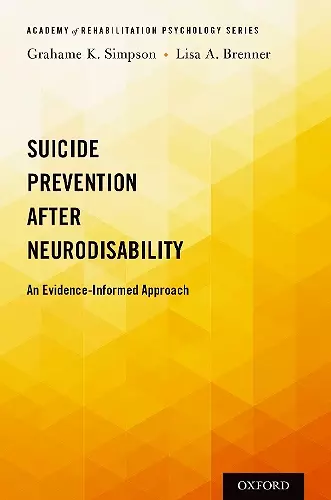Suicide Prevention After Neurodisability
An Evidence-Informed Approach
Grahame K Simpson author Lisa A Brenner author
Format:Paperback
Publisher:Oxford University Press Inc
Published:7th Mar '19
Currently unavailable, and unfortunately no date known when it will be back

Suicide risk after disabling neurological conditions is up to five times higher than for the general population; however, knowledge about the extent of the problem, associated risk factors, and effective evidence-informed suicide prevention approaches are limited and fragmented. Suicide Prevention after Neurodisability focuses on the challenges faced by eight different types of neurodisability, namely stroke, spinal cord injury, traumatic brain injury, amyotrophic lateral sclerosis, epilepsy, Huntington's disease, multiple sclerosis, and Parkinson's disease. It pulls together the current knowledge about this risk, detailing a complex interplay between neuropathological, psychiatric, psychological, and psychosocial factors that in part account for this increased presence of suicidal thoughts and behaviors. Despite the challenges, suicide is often preventable. The best available evidence-informed approaches to suicide prevention in neurodisability are outlined, including clinical approaches to screening, suicide risk assessment, psychotherapeutic interventions, and psychosocial management. The reader-friendly approach will help make suicide prevention after neurodisability everyone's business.
This is an invaluable resource for professionals working with persons who have disability due to neurological disorders, or "neurodisability." The explosion of suicides among persons with neurological impairments, especially those with traumatic brain injury, deserves the focused attention provided in this volume. The book is thoroughcovering theory, neurobiology, epidemiology, assessment, intervention, and prevention. The seven chapters addressing clinical care build on previous research and practice to elucidate novel perspectives and new approaches. * John D. Corrigan, PhD, Professor of Physical Medicine & Rehabilitation, The Ohio State University *
This outstanding book, masterfully developed by two international thought leaders on suicide and neurodisability, provides evidence-informed guidance on suicide prevention and intervention for persons with neurodisability in a manner that effectively synthesizes current scientific knowledge and rational practice. It is the most comprehensive clinical resource on this topic. * David B. Arciniegas, MD, Clinical Professor of Neurology and Psychiatry, University of Colorado, Chairman and CEO, International Brain Injury Association *
ISBN: 9780199928415
Dimensions: 231mm x 155mm x 18mm
Weight: 431g
288 pages